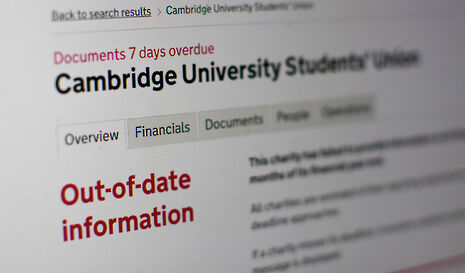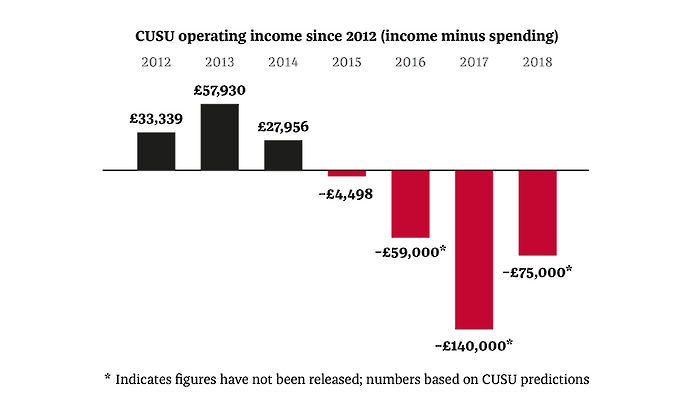CUSU U-turns on story behind deficit in budget proposal
CUSU’s statutory Trustee report and audited finances are now seven days overdue, in the aftermath of revelations about its significant financial losses

CUSU has changed its story on how its reserves took a hit of nearly £200,000 over the last two years, with a more detailed budget proposal also raising questions about its staffing costs and affiliation fees.
It comes as CUSU becomes a week late to submit its statutory documentation to the Charity Commission, which is expected to show a loss in 2015–16 of around £59,000. The student union revealed last week that it had suffered heavy financial losses as the result of messily leaving a contract with St James’ House (SJH), a publisher. Revenue from publications has historically been a key part of CUSU’s income.
A 10-page document, sent to CUSU Council members by president Amatey Doku last night, outlines in further detail the cuts and shortfalls expected for the next financial year. Next Monday, Council members will have to vote on the proposed budget. The budget proposes total expenditure of £727,966, and income of £653,512 – placing anticipated losses at £74,454. It confirms that CUSU will be seeking another bailout from the University.
LISTEN: Explaining the black hole in CUSU’s new budget
Varsity’s current affairs radio show, The Sunday Review, talks budgets and overspending with Editor-at-Large Louis Ashworth and CUSU Vice President Roberta Huldisch. The Sunday Review is hosted by Peter Chappell and Martha O’Neil.
The document significantly revises several statements made by Doku and CUSU General Manager Mark McCormack at the last Council meeting. At the meeting on Monday, Doku had said that there were more publications due to arrive as part of contract “slippage” with SJH, but that he did not know when or whether they would arrive.
The new document contradicts that, saying that CUSU is no longer anticipating further publications and that Cambridge Strategies, which was released in March last year, was the “final publication of the contract”. It says that the student union was in a agreement with SJH from 2012, which lapsed in 2015, and that negotiations for a new contract have not yet been successful. Varsity has contacted CUSU for clarification.
Significantly, the paper says negotiations for the new contract began partway through last year, “by which point CUSU did not expect to receive any income from a careers publication for the 2015-16 or 2016-17 year”.
Given that failure to reach a contract was one of the reasons underpinning CUSU’s announcement that it anticipates a deficit of around £75,000 next year, this news is likely to cause significant controversy among members of Council, who may ask why the student union’s last two budgets have included significant expected income from publications when no contract was in place.
Several members of Council, which is comprised mainly of JCR and MCR presidents, vice-presidents, and external officers, privately raised concerns with Varsity about this apparent change in information.
The draft budgets confirms that there will be no further funding cuts to The Cambridge Student, and includes cuts to the funding of the CUSU liberation campaigns.
The document proposes an affiliation fee rise of 1 per cent per year, a proposal that was floated at Council last Monday, where it received a mixed but broadly positive response. Affiliation fees – which JCRs and MCRs pay at a per-student rate of £6.70 a year for undergraduates and £3 a year for graduates – have had their values frozen since 2010.
The decision to formally propose a rise represents the final abandonment of a target from CUSU’s Strategic Plan 2014–17, a document which was intended to guide the student union to growth over the past three years. The Plan proposed an aim that affiliation fee income, which currently floats at around £100,000 a year total, be reduced by around 25 per cent – describing such fees as a “vulnerable income stream”.
CUSU has been attempting to change its funding from colleges for some time, with Council voting last November to approve a change to a ‘block grant’ model, in which all colleges would pay a fixed amount per year. The proposed changes are currently stuck, facing resistance from several college bursars.

In addition to increased affiliation fees, JCRs will also be hit with cuts to the support they receive from CUSU. In the proposed budget, CUSU has allocated just £1,300 to college common rooms, including training provided to JCR officers, a drop of more than 75% on this year. Together with affiliation fee hikes, this will leave college JCRs a combined total of £7,204 worse off per year.
The document confirms that CUSU will request a new bailout, as part of a significantly increase funding round application to the University. It says “CUSU will be seeking financial assistance from the University whilst it undergoes a transition period to a new, more stable funding model”. A bailout of £60,000 for lost income was given to the student union in 2015. Answers given on Monday suggested that CUSU was expecting that figure to be repeated annually until revenue streams were fixed, but instead it was received as a one-off.
On Thursday, a University of Cambridge spokesperson told Varsity “The University provides funding to both student unions in the form of a grant. In this year’s request to the University, CUSU acknowledged a possible shortfall as they move away from high risk publications and focus on delivering core services to students. CUSU did not request additional funding to address this shortfall, and will instead use their funding reserves.”
Other areas that may raise questions include the absence of CUSU’s normal premises cost. For the past two years, CUSU has budgeted a fee of £86,000 for its office at 17 Mill Lane. This figure is matched by the University in an allocation grant, meaning that no overall loss or gain is made. This figure in absent from the new budget.
The latest figures are likely to spur further questions about CUSU’s staffing costs, which are projected to rise by just under £50,000 next year, from £374,763 to £423,774. This is despite the document claiming that average staff wages have fallen. The only newly listed position is one of “Membership Team management”, which is set to be shared in part with the Graduate Union. Under last year’s rates, payments for sabbatical officers can be expected to be around £20,400, but CUSU has hidden the specifics of staff pay since 2013, when The Tab Cambridge reported that general manager Mark McCormack had received an 18 per cent pay rise of £6,500.
St James’ House was contacted for comment last week
 News / Colleges charge different rents for the same Castle Street accommodation2 March 2026
News / Colleges charge different rents for the same Castle Street accommodation2 March 2026 News / News in Brief: waterworks, wine woes, and workplace wins 1 March 2026
News / News in Brief: waterworks, wine woes, and workplace wins 1 March 2026 News / Climate activists protest for ‘ethical careers policy’1 March 2026
News / Climate activists protest for ‘ethical careers policy’1 March 2026 News / Angela Merkel among Cambridge honorary degree nominees27 February 2026
News / Angela Merkel among Cambridge honorary degree nominees27 February 2026 News / Private school teacher who lied about Cambridge degree barred from teaching27 February 2026
News / Private school teacher who lied about Cambridge degree barred from teaching27 February 2026










